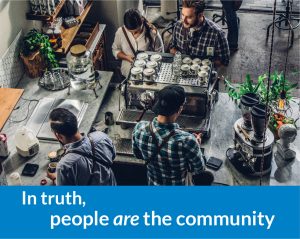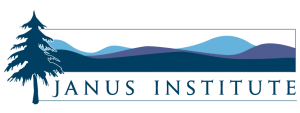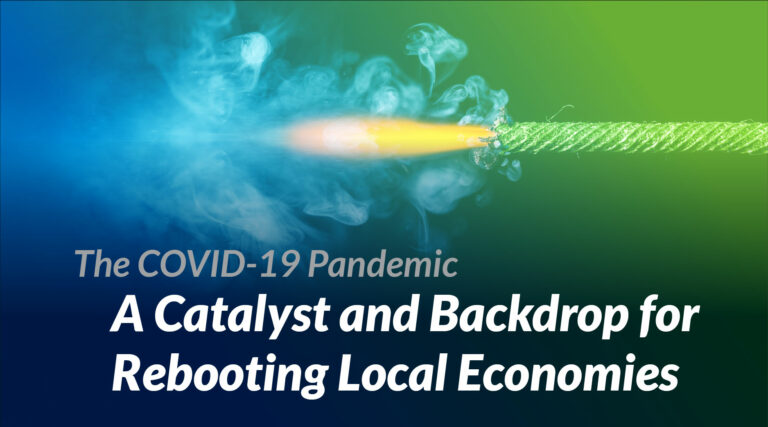With a growing economy requiring more highly skilled workers, workforce development has become the hottest of topics. As discussed in “A Chicken vs. Egg Redux”, employers can be strongly attracted to communities that have educated and skilled workers. Assessing the local labor force and marketing the community to matching industries has been an economic development practice for years, but new tools and techniques can take this approach to a much higher level, as blog author Chuck Russell describes below.
Years ago, communities seeking more employment opportunities for residents and companies seeking compatible workers would look at the industrial composition of local jobs. Then, they began to look at specific occupational codes, and then skill sets through O*Net data. None of these methods, however, could address an underlying determinant of a worker’s compatibility with a company and specific job: the underlying personality traits and innate talents. “Optimizing the Local Labor Force” begins a discussion on how to do this, and to quote from the Prosperous Places homepage, make your community stand out. More on this important topic will come later.
Optimizing the Local Labor Force
(Chuck Russell, Chairman & Chief Knowledge Officer, BestWork DATA, LLC)
It is ironic that the most powerful resource within a city is too often the source of its greatest challenges. People start and operate businesses. They build homes and establish communities. They raise families and educate their children.  In the best cases, the businesses thrive; the communities are vibrant; the children grow up to add more life to the city. In a complex world, this is often not the case.
In the best cases, the businesses thrive; the communities are vibrant; the children grow up to add more life to the city. In a complex world, this is often not the case.
About half of the small businesses in most cities fail. This creates a steady current of unemployment and a sense of uncertainty in the families of those affected. The digital revolution, artificial intelligence, and other economic events cause disruptions in the business foundation of the cities. Workers must be retrained and find new roles in a changing world. These training programs have a poor record of success, despite the apparent need and the money spent on such programs. The very best education or training that is mismatched to the strengths and abilities of the participants is wasted. It is the same as training a Sumo wrestler to become a pole vaulter. Even if they acquire the knowledge, they are not able to perform the sport at a competitive level.

Cities must recruit new businesses or industries to replace those that are struggling. What businesses to attract and how to attract them are major questions. Cities frequently compete with one another for the businesses.
 Education has its own challenges. Many educational programs are not preparing students for today’s business environment. In some countries, there is huge unemployment at the same time as the businesses in those countries are decrying the lack of qualified workers to fill millions of jobs. The majority of students in universities lack a clear direction to a viable career. In too many places, the education is simply not connected to employability.
Education has its own challenges. Many educational programs are not preparing students for today’s business environment. In some countries, there is huge unemployment at the same time as the businesses in those countries are decrying the lack of qualified workers to fill millions of jobs. The majority of students in universities lack a clear direction to a viable career. In too many places, the education is simply not connected to employability.
The foundation of every city is its people. The foundation of the people is the set of hard-wired personality traits and cognitive abilities that determine how each person thinks, learns and behaves. The people never lose these strengths and abilities. They remain constant throughout a lifetime of challenges. They are the foundation upon which any education or training must be built. What does this mean to the cities?
Imagine having data that reliably measures an individual’s hard-wired personality traits and cognitive abilities. This data can then be used to connect the strengths and abilities of people to the behavioral requirements for a particular job. This is critical because for every person there are many jobs that do not fit their set of strengths and abilities, and these are best to avoid if possible. Even when the circumstances require a person to work at that job for some period of time, knowing and understanding the difficulties makes it easier. The good news is that there many other jobs that do match the set of strengths and abilities of each person. These are jobs which that person can perform successfully, some adequately and some exceptionally.
 When the underlying strengths and abilities of people can be matched to certain types of jobs or training, employers can more easily find the most suitable employees for specific positions, maximizing productivity and minimizing turnover. This can be an enormous advantage in a number of ways: employers are more profitable, employees are more satisfied and productive, and the community obtains a competitive advantage in recruiting and starting new businesses. No doubt, people are the most important resource a community has to offer. In truth, people are the community. Future blogs will discuss how to optimize the local labor force.
When the underlying strengths and abilities of people can be matched to certain types of jobs or training, employers can more easily find the most suitable employees for specific positions, maximizing productivity and minimizing turnover. This can be an enormous advantage in a number of ways: employers are more profitable, employees are more satisfied and productive, and the community obtains a competitive advantage in recruiting and starting new businesses. No doubt, people are the most important resource a community has to offer. In truth, people are the community. Future blogs will discuss how to optimize the local labor force.

- With increasing competition for skilled labor, promoting the local workforce to attract new companies or retain existing ones is becoming even more important. How does your community assess and promote its workforce?
- What are your thoughts on the best ways to evaluate a local workforce? What are the best ways to promote its workforce to potential investors?
We look forward to your input. Have some thoughts to the questions and content above? Feel free to post them in the comments below. Please feel free to post your title and organization in the field. Your email will not be displayed.
About Chuck Russell
 Chuck Russell is a thought leader in the business applications of predictive data that measure how people think, learn and behave. His first book, Right Person-Right Job, Guess or Know, showed how the information provided by the latest generation of assessment technology shattered the traditional paradigms of management, hiring, and training. Over the last ten years, he has developed a series of innovations within the assessment industry that can help workforce programs identify the talents of job seekers and match them with current job openings. Chuck graduated from Spring Hill College, majoring in Economics. He is on the board of the Global Trust Registry, a member of Mensa and an international speaker on entrepreneurship and the impact of assessment data on employment and education. For further information, contact: Chuck Russell at chuck@bestworkdata.com.
Chuck Russell is a thought leader in the business applications of predictive data that measure how people think, learn and behave. His first book, Right Person-Right Job, Guess or Know, showed how the information provided by the latest generation of assessment technology shattered the traditional paradigms of management, hiring, and training. Over the last ten years, he has developed a series of innovations within the assessment industry that can help workforce programs identify the talents of job seekers and match them with current job openings. Chuck graduated from Spring Hill College, majoring in Economics. He is on the board of the Global Trust Registry, a member of Mensa and an international speaker on entrepreneurship and the impact of assessment data on employment and education. For further information, contact: Chuck Russell at chuck@bestworkdata.com.
![2021 Prosperous Places Logo [TM]](https://www.prosperousplaces.org/wp-content/uploads/2021/02/20210205_JI_PPTM-Logo.png)






